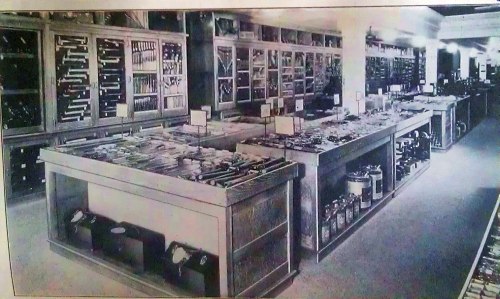|
|
|
 Joel's Blog Joel's Blog |
 Built-It Blog Built-It Blog |
 Video Roundup Video Roundup |
 Classes & Events Classes & Events |
 Work Magazine Work Magazine |
| Newer Entries... | |
 | You Are Invited to HandWorks May 24-25 2013 Amana, Iowa - 10/02/2012 |
 | Ron Hock Visit and Other News - 09/25/2012 |
 | Secrets of Sharpening - The Wet Paper Towel - 09/11/2012 |
 | How To Build a TARDIS - 09/06/2012 |
 | Norris vs. Stanley C. 1880's - Stanley Wins! - 09/04/2012 |
 | Happy Summer and Progress - 08/28/2012 |
 | New for August - Mobile Web Site - 08/16/2012 |
 | Summer 2012 - Counting the Stars - 08/07/2012 |
 | If You're Happy And You Know It Stamp Your Feet - 07/31/2012 |
 | A Nation That's Losing Its Toolbox - 07/24/2012 |
 | In Which We Welcome Rex Into Our Machine Shop Family - 06/26/2012 |
 | Tools As Art - 3 (and some miscellaneous musings) - 06/20/2012 |
 | Carving Progress - Five Things I Have Learned So Far - 06/12/2012 |
 | The Northumbria University Designers in Residence Program - 06/05/2012 |
 | Too Many Projects!! - 05/30/2012 |
 | Not a Dovetail In Sight - 05/29/2012 |
 | Which Saw First? - 05/22/2012 |
 | Plane Parts - 05/15/2012 |
 | The Implications of New Research Opportunities - 05/08/2012 |
 | The Nurse Regulator - 05/01/2012 |
| Older Entries... | |
|
Hours: M-F 9:00-5:00, closed Sat,Sun Our Guarantee & Return Policy Shipping and Sales Tax Info Privacy Policy Holiday Calendar |
|
Contact Us:
Email: support@toolsforworkingwood.com Phone: 800-426-4613 or 718-499-5877 Visit Us in Brooklyn: Directions to Our Showroom © 1999-2019 toolsforworkingwood.com Powered by 01 Inc. Coded entirely in NYC |




"As a nation we want to be craftsmen, but many people don't have the time and have lost the incineration to get their hands dirty."
But seriously, there really is no incentive to create new trade schools when there is no call for workers in most trades. Since as a country we have decided to become a throw away society with most all products to be thrown away coming from overseas. You and I can't compete in this market. Why, the cost of our lumber alone negates any competitiveness we might hope for. Speaking as a hobbyist mind you, not an industrialist. But even then...
If you talk Antique Hand tools made furniture ,it just floors a lot of potential customers.All I here is made the "Amish". PLEASE don't get me started on that whole marketing scam.
I hope the select market for Hand made ,quality furniture stay around for awhile longer.re
On the other hand, the USA has always been the land of do-it-yourself. We came by it honestly. It's not just "pioneer spirit" either. When a large number of Americans were farming for a living, being an all-around handyman was a survival skill for many, perhaps most American young men and women. Americans aren't as "handy" now partly because we don't have to be. Our livelihoods don't depend on it. Mine certainly doesn't. I pursue my craft because I enjoy it, and because it allows me to live more cheaply. I don't have to hire a plumber to install a toilet or hire a cabinet maker to build me a set of shelves. I can do it myself.
It reminds me of the hand wringing by those concerned about leaving unmanageable national debt to the next generation while driving around the country in their RVs with bumper stickers that read - "We're Spending our Children's Inheritance..." At some point, actions and words need to coincide on some level to be taken seriously. Yeah, I'm cynical but not without reason.
As such, I really don't think we give a rat's patootie about some future generation's adoption of the craft for their sake or that of the craft. If we're honest with ourselves, we're more concerned about our own PRESENT self interests whether as a woodworking professional, hobbiest, manufacturer, retailer, whatever the case may be. And the best evidence for this position is the utter lack of self-sacrifice for the craft or its future generation on almost every level.
The stated "dilemmas" in the woodworking community today are nothing more than a reflection of the larger rhetorical nonsense that pervades our individual self interests and inaction on a national level. If we really cared, we would do something about it but we don't. Our purported concerns for the future of x, y, or z sound wonderful and make us feel good, but they belie our present behaviors.
No, don't worry about what I have or have not done lately, worry about what you've done lately and should be doing.
Cheers,
I don't matter
Our loss of manufacturing jobs in the late 1950s had a major drop because that is when new standards to reduce pollution began to come into play. In the article there is no mention of the fact that many factories shut because they could not afford to modernize. So jobs left and went to countries where those regulations were not a cost factor.
When there is further equalization of wages and pollution controls the jobs will once again become local.
The article mentions that countries like Germany still maintain apprenticeship programs. We need to find some way to reincorporate that here. That's a combination of cultural attitudes and corporate and government policies. People have to be willing to invest in training, whether it's the employers or the employees. The problem right now is that no one wants to pay for it. The financial model to support that has broken down and needs to be rebuilt.
One thing for sure is that I would have certainly loved to work at the E.L. Wislon Hardware Company back in 1929.
It does seem to be a crisis of values, as I read the above contributions; i.e. consumerism/industrialism gone too far vs. humanitarian concerns.
The best of Craft grows out an act of generosity when one person is helping to fill a need of another. Craftsmanship enters when that need is met with grace, patience and, dare I say, skill.
Skill acquired through hours of practice and through self teaching or the skill of sound teachers. Craftsmanship, perhaps more than anything else, suggests a care and concern for those people and those resources around us.
Below is what I wrote to the NY Times in response to the original article that Joel thankfully highlighted for us...thank you for the discourse...
I am a craftsman and I teach woodworking. The beauty of teaching and practicing craftsmanship is that the underlying principles have a universally applicable quality. Students must practice precision, discipline and tenacity to yield positive and progressively more sophisticated results. My students produce beautiful, well-made furniture and are assessed on product and, perhaps most importantly, process—i.e. craftsmanship in practice.
I repeatedly remind our students that appreciating well executed craft and walking a path of mastery, in something like woodworking, opens your knowledge base and sense of self, as it relates to reaching a level of mastery in any life pursuit.
My sense is that an appreciation and predisposition for craftsmanship is in our DNA as individuals and as a culture. By demonstrating a true commitment to the values and value of craftsmanship we could move from a philosophical lament to actually increasing resources for such pursuits; perhaps then we may begin to make real strides in rejuvenating our manufacturing sector.
I, and my shop teaching colleagues, work daily in our classrooms/shops to stimulate students creatively and intellectually so that they create in the hands on tradition. The results are tangible, measureable and inspiring.
Dan Gordon
Teacher of Practical Arts,
Mahwah High School,
Mahwah, NJ
Does anyone out there that DOES handwork / craftwork / woodworking / blacksmithing / etc use 'interns' in their business?
Would you be interested?
Talk to your insurance provider first about the ramifications, and the local employment office. The put your ad on Craigslist, or in the PennyPincher news (or similar local publication) and see if you can get some help.
Now figure you WILL pay for the help. You NEED to educate them and expect mistakes, but you will grow them, your business, and your craft IF you are willing to invest in people. ... Oh yes, do celebrate their successes, holidays, another year in business, whatever with them. Give them an engraved woodworking plane or something as a 'graduation present' when they turn from novice to journeyman in your care. Also celebrate when they want to 'break out' and go to the next step in their life. If you are lucky you will get an intern for 1, 2, 3 years, or they could turn into a business partner and friend. Then there is the opportunity to raise up another person as the more experienced intern moves to the next stage in their life.
Have I done it, myslef? No. I worked for large firms doing computer geek work. But I did mentor many that turned into 'master workers' in their own right.